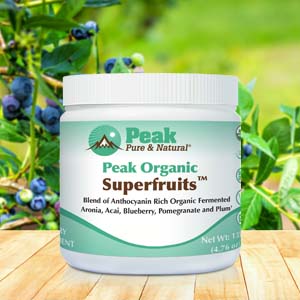Get Easy Health Digest™ in your inbox and don’t miss a thing when you subscribe today. Plus, get the free bonus report, Mother Nature’s Tips, Tricks and Remedies for Cholesterol, Blood Pressure & Blood Sugar as my way of saying welcome to the community!
The diet that improves aging (even in nursing home residents!)

I’ve said it before, but I’ll say it again… the secret to feeling and looking young isn’t in a high-priced serum. It’s inside you…
Research shows that the “fountain of youth” is hiding inside your microbiome (the collection of microbes that live in your gut).
These microbes impact how long you live, what diseases you do or don’t get and how quickly you age. And that news should have you jumping for joy. Why?
Because there’s so much you can do to influence your microbiome in a positive way. A few simple changes could have you looking and feeling better than you have in years… even if you got your AARP membership card decades ago.
Case in point?
A new study shows the Mediterranean diet could quickly cause changes in your microbiome that make you more youthful and less inflamed…
The Mediterranean diet triggers big bacterial changes
A recent study published in the journal Gut showed that older adults living in long-term care facilities were able to reduce inflammation and improve markers for aging by eating a Mediterranean diet for a year.
As you probably know, as you age, your body starts breaking down and becomes more inflamed. This leads to frailty… or what’s commonly thought of as “getting old.” You walk slower, feel creakier and weaker and just don’t have as much physical or mental spunk as you once did. But here’s something you may not know…
The onset of frailty is tied to changes in your microbiome. And these changes are usually triggered by a poor or restricted diet.
Older adults living in long-term care facilities, for example, often restrict their diets because of health problems, dental problems or preferences. As a result, they don’t always get the good stuff the gut needs. That’s why researchers wanted to see if a Mediterranean diet could get their guts back in shape… and it did.
The study included 612 people between 65 and 79 years old. Researchers analyzed their microbiomes at the start of the study. Then they asked study participants to eat a Mediterranean diet for 12 months. After 12 months, researchers analyzed their microbiomes again. And guess what? There were some GOOD changes…
- The Mediterranean diet improved bacterial diversity… something that’s usually lost with age.
- It also gave a boost to bacterial strains specifically tied to improvements in aging markers like walking speed, handgrip strength, brain function and memory.
- And it boosted a strain of bacteria tied to lower production of inflammatory chemicals… and one tied to the increased production of bacteria that produce beneficial short-chain fatty acids.
- There was also a decrease in bacteria that produce a type of bile acid associated with insulin resistance, fatty liver and cell damage.
Those are some impressive microbial shifts!
But do you know what’s even cooler? Researchers say that the bacteria produced as a result of the Mediterranean diet were like a “keystone species.” If you remember high school biology class, you know that keystone species are the foundations of an ecosystem. If you lose a keystone species, the entire ecosystem doesn’t last long after. So, the bacteria produced by the Mediterranean diet are the foundation of a stable gut ecosystem.
You may be wondering why a Mediterranean diet is so good for gut health. Here’s the answer… Fiber, vitamins and minerals.
When you eat a Mediterranean diet, you eat lots of fruits, veggies, whole grains, nuts, legumes and other foods filled with fiber, as well as vitamin C, vitamin B6, vitamin B9, copper, potassium, iron, manganese and magnesium. You also get healthy fats from olive oil and fish.
Mastering the Mediterranean
Are you ready to go Mediterranean? At this point, how could you not be! If you are, here’s how to get started:
- Eat lots of vegetables and fruit. Produce should make up the majority of your diet. Shoot for five to ten servings of fruits and veggies per day. A serving is about a half-cup cooked or a whole cup raw.
- Pick your animal protein carefully. The Mediterranean diet focuses on lean protein, like fish and poultry. Although, red meat is allowed in moderation. You can also eat eggs.
- Get plenty of plant-based protein. Nuts, seeds, and legumes are all an important part of a Mediterranean diet.
- Only go for whole grains. You’ll have to ditch refined grains in favor of whole grains if you want to reap the benefits of a Mediterranean diet.
- Heap on the healthy fats. Fatty foods like olive oil, avocado, walnuts, and almonds play a huge part in the Mediterranean diet’s health benefits, so eat a lot of them.
- Do dairy in moderation. Some dairy is allowed on the Mediterranean diet. But choose healthier options like probiotic-rich yogurt, cottage cheese or kefir.
Editor’s note: Did you know that when you take your body from acid to alkaline you can boost your energy, lose weight, soothe digestion, avoid illness and achieve wellness? Click here to discover The Alkaline Secret to Ultimate Vitality and revive your life today!
Sources:
- Mediterranean diet promotes gut bacteria linked to ‘healthy ageing’ in older people — MedicalXpress
- Mediterranean diet intervention alters the gut microbiome in older people reducing frailty and improving health status: the NU-AGE 1-year dietary intervention across five European countries — Gut
- The Microbiome and Aging — Annual Review of Genetics
- Can the gut microbiome unlock the secrets of aging? — Medical News Today
- No Need to Limit Healthy Fats With the Mediterranean Diet, New Study Says — Health
- 10 Things to Know About the Mediterranean Diet — Health














